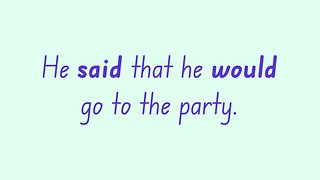When converting direct speech into reported speech, the modal verb 'will' typically undergoes a backshift to 'would'. This change reflects a past perspective on the original statement.
General Rule:
Direct Speech: Subject + will + Verb (base form) + ...
Reported Speech: Subject + would + Verb (base form) + ...
Examples:
Direct: "I will go to the party."
Reported: He said that he would go to the party.
Direct: "They will finish the project by Friday."
Reported: She said that they would finish the project by Friday.
When to CHANGE 'will' to 'would':
1. When the reporting verb is in the past tense: This is the most common scenario. If the verb introducing the reported speech (e.g., said, told, asked, explained) is in a past tense, 'will' nearly always changes to 'would'.
Example: He said, "I will call you." → He said he would call me.
2. When the reported statement refers to a future event that is no longer relevant or certain from the perspective of the reporting time: This often applies when the original prediction or intention has passed, changed, or is uncertain.
Example: "I will visit Paris next year." →She told me that she would visit Paris the following year (implying the visit might not happen or is viewed from a past perspective).
3. When reporting a promise, offer, or request made in the past:
Example (Promise): "I will help you." → He promised he would help me.
Example (Offer): "I will carry your bags." → She offered that she would carry my bags.
Example (Request - polite): "Will you please close the door?" → He asked if I would close the door.
When NOT to CHANGE 'will' to 'would':
1. When the reporting verb is in the present tense: If the reporting verb is in a present tense (e.g., says, tells, asks, explains), the tense in the reported speech generally remains the same.
Example: He says, "I will call you." → He says he will call me.
2. When the reported statement expresses a general truth, a scientific fact, or a habitual action that is still true: If the 'will' refers to something that is universally or consistently true, it often remains 'will'.
Example: The scientist said, "Water will boil at 100 degrees Celsius." → The scientist said that water will boil at 100 degrees Celsius. (The fact is still true).
3. When the reported statement refers to a future event that is still certain or relevant at the time of reporting: If the original future event is still expected to happen and is relevant to the present moment, 'will' can sometimes remain 'will', especially if the meaning would be distorted by changing it to 'would'.
Example: (Today, about a scheduled event) "The concert will start at 8 PM." → They announced that the concert will start at 8 PM. (The concert is still going to happen at that time).

